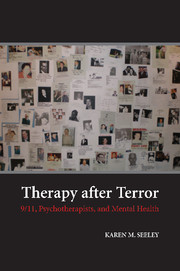Book contents
- Frontmatter
- Contents
- Acknowledgments
- Introduction
- 1 Trauma Histories
- 2 Volunteers for America
- 3 “Get Me Counselors!”
- 4 The Psychological Treatment of Trauma
- 5 The Trauma of Psychological Treatment
- 6 Diagnosing Posttraumatic Stress Disorder
- 7 Trauma as Metaphor
- 8 Mental Health in Traumatic Times
- Notes
- Works Cited
- Index
2 - Volunteers for America
Published online by Cambridge University Press: 05 August 2012
- Frontmatter
- Contents
- Acknowledgments
- Introduction
- 1 Trauma Histories
- 2 Volunteers for America
- 3 “Get Me Counselors!”
- 4 The Psychological Treatment of Trauma
- 5 The Trauma of Psychological Treatment
- 6 Diagnosing Posttraumatic Stress Disorder
- 7 Trauma as Metaphor
- 8 Mental Health in Traumatic Times
- Notes
- Works Cited
- Index
Summary
On the morning of September 11, 2001, the individuals and organizations that should have known the most about unfolding events, so that they might have had the chance to influence their course, were often the least informed. New York City air traffic controllers did not know that airplanes had been hijacked and were heading their way; their New England colleagues had failed to notify them (Dwyer & Flynn 2005). Government employees, even those directly concerned with national security, were not advised about the first plane that hit the Trade Center by specialized intelligence agencies; instead, they learned about it by watching the Cable News Network (9/11 Commission 2004). First responders who rushed to the scene also lacked critical information. Firefighters standing at the bottom of the north tower could not see the enormous gash near its top, some ninety floors above them; those who ran inside the building were cut off from breaking news because their radios malfunctioned in skyscrapers. Police officers who were aloft in helicopters circulating the tower, and who had a clear sense of the devastation, failed to warn firefighters about it. People inside the towers, whose offices were on the floors that were closest to the airplanes' impact, often knew little about what had happened.
- Type
- Chapter
- Information
- Therapy after Terror9/11, Psychotherapists, and Mental Health, pp. 39 - 60Publisher: Cambridge University PressPrint publication year: 2008

